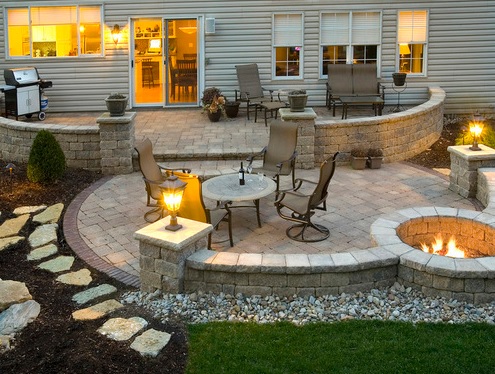The best brick paver sealer for sealing your brick pavers will depend on what your brick pavers are currently sealed with, what you want your brick pavers to look like once sealed, and what you need your brick paver sealer to offer for performance.
Brick Pavers
There are many types of brick pavers on the market, but they all fall under one of two categories: concrete pavers or red clay brick pavers. The type of brick paver will determine the porosity and the porosity will determine which types of sealers are best to use.
| Silicate Sealers | Silane Siloxane Sealers | Acrylic Sealers | |
| Red Clay Brick | X | ||
| Concrete Pavers | X | X |
Frequently Asked Questions:
What happens if you put a silicate on a paver? If you over apply a silicate, white crystals will form on the surface of the pavers. These crystals can only be removed if the top later of the paver is removed. More information can be found below under Types of Brick Paver Sealers.
What happens if you put an acrylic on a clay brick? Concrete pavers are more dense than red clay brick pavers which is why an acrylic sealer will survive on a concrete paver and not a red clay brick paver. Red clay brick pavers, like the old Chicago style bricks, are very porous and allow for large amounts of water and moisture to move through the brick to the surface. Acrylic sealers are sensitive to moisture so when the moisture moving through the brick hits the surface, it can cause the acrylic sealer to delaminate.
Types of Brick Paver Sealers
The three main types of sealers that can be used to seal brick pavers are concrete densifiers, water repellent sealers, and acrylic sealers. While they all fall under the category of being a penetrating sealer, they could not be any more different.
- Concrete Densifiers: Concrete densifiers chemically react below the surface of the paver to form a calcium silicate hydrate (CSH) barrier within the pores. The barrier is just as hard as concrete, and will help to increase the density and strength of the paver surface. This is a great type of sealer to use on weak or deteriorating pavers, or pavers with dusting issues, but if you apply a concrete densifier to pavers you need to apply with caution. If a silicate sealer is over applied, which is very easy to do on porous pavers, the unreacted material will form CSH crystals on the surface. These crystals can only be removed by removing a layer of the pavers (grinding the surface). If you choose to apply a silicate, apply it in very diluted, thin, light coats.
- Water Repellent Sealers: Water repellent sealers are the most popular type of sealer to use on pavers if you want to maintain the natural, unsealed look of the pavers. Water repellent sealers chemically react below the surface to form a hydrophobic barrier within the pores that caused water and other liquids to bead off the surface. Water repellent sealers are great for reducing deterioration caused by water absorption including cracking, spalling, pitting, freeze-thaw damage, mold and mildew, and efflorescence. The two main types of water repellent sealers are Siliconate water repellents and Silane-Siloxane water repellents. Siliconate water repellents can leave a white haze on the surface which is why Silane Siloxane sealers are the best type of water repellent sealer to use on pavers.
- Acrylic Sealers: Acrylic sealers are great sealers to use if you are looking for a wet look, low gloss, or high gloss finish. They are designed to enhance and protect paver surfaces.
Brick Paver Sealer Reviews
Best Water Repellent Concrete Sealers
- Armor SX5000: DOT approved solvent based Silane-Siloxane water repellent sealer
- Armor SX5000 WB: DOT approved water based Silane-Siloxane water repellent sealer
Best Acrylic Concrete Sealers
- Eagle High Gloss Sealer (average 4.6 star review)
- Armor AR350 Wet Look Sealer (average 4.8 star review)
- Armor AR500 High Gloss Sealer (average 4.9 star review)
- Enduraseal SB Acrylic Sealer (average 4.5 star review)

